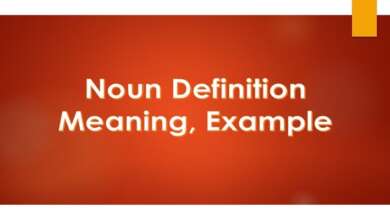Pronoun Definition In English, Meaning, Types, Example | PDF
Pronoun Definition & Meaning, Types, Example
Pronoun Definition In English, Meaning, Types, Example, (Download PDF) – The pronoun is very important in grammar because, in colloquial language, pronouns are used in many ways, so today we will understand well about pronoun – what is Pronoun, the Definition of pronoun, How many types of Pronouns are there, so let’s start.
Definition of Pronoun
– Words that are used in place of noun words are called pronouns.
Ram is a student. Ram studies in my school. And Ram came to school yesterday. There suddenly Ram’s health deteriorated. Ram said that Ram’s health deteriorated. Ram was sent to the hospital.
In the above sentences, Ram is a noun from the point of view of grammar. Ram’s name appears in every sentence. The use of the term ‘Ram’ again and again does not seem appropriate.
Therefore, in the above sentence, it is appropriate to use other words instead of the word Ram. For example, Ram is a student. He studies in my school. He came to school yesterday. There suddenly his health deteriorated. He said my health got worse. He was sent to the hospital.
In the above sentences, in place of Ram, the words he, she, my, her, his, have been used.
Ram is a noun. Hence the words which have been used in place of Ram. That underlined word is a pronoun. Words that are used in place of noun words are called pronouns.
Examples of pronoun
The name is also called a noun. Nouns refer to only one name but pronouns refer to all names.
In the above example, Ram is a noun. Ram is one name in it. Whereas ‘he’ is a pronoun in place of ‘Ram’. ‘Ram’ is one name, ‘He’ is the name of all. Because he is suitable for all – Ram, Shyam, Ravi, Salim, Joseph, Sita, Geeta, etc.
All these names call themselves ‘I’. Hence ‘I’ is also a pronoun. For others say ‘you’. Hence ‘you’ is also a pronoun. I, you, he, etc. are suitable for all names and are pronouns.
Examples –
- He studies in my school.
- I came to school yesterday.
- There suddenly his health deteriorated.
- You said you got sick.
- He was sent to the hospital.
Here he, I, her, you, him, etc. are all pronouns.
Types of Pronoun
Like other types of grammar, there is no consensus among scholars regarding the type of pronoun, some scholars consider 6 distinctions of pronouns and others consider 5 distinctions, most scholars consider 6 distinctions of pronouns which are as follows –
- Personal pronoun
- Definite noun
- Indefinite pronoun
- Relative pronoun
- Interrogative pronoun
- Reflexive pronoun
(1) Definition of personal pronoun
The pronouns used for the speaker for himself, for the listener, and for others are called Personal pronouns.
The speaker uses the words I, my, we, our, etc. for himself. Uses the words you, yours, etc. for the listener. For others who are not in front of him, he uses the words he, they, his, their, etc. All these words used by the speaker are called Personal pronouns.
There are three aspects here – speaker, listener, and others. On the basis of three aspects, there are three distinctions of Personal pronouns – (A) perfect man (speaker), (B) middle man (listener) (C) other men.
Types of Personal pronoun
(A) Definition of Subjective Pronoun –
The pronouns that the speaker (speaker) and the writer who writes for himself are called perfect men (Subjective Pronoun). Like we, mine, ours, me, us, etc.
Basically, the perfect man is only ‘I’. According to the verse, the plural becomes ‘we’. Of factors According to – mine, I, me, ours, us, etc. everything goes on being created.
Example –
- I am going to school.
- We are happy.
- He went to Delhi.
Here I, we, he are examples of Subjective Pronouns.
(B) Definition of objective pronoun –
The pronoun words used by the speaker for the listener are called middle man (objective pronoun). Like – me, we, you, yours, etc.
Basically, the middle man is ‘thou’ and ‘you’ is singular ‘thou’ and its plural form is ‘you’. For example, what you read is a word. You read is plural. Nowadays the word ‘you’ is also used in a word for etiquette. The word ‘thou’ is used for the very near or the little ones. ‘You’ is also used in the singular as a sign of respect.
Example –
- Ram was with me.
- The Gita calls us.
- She has a crush on you.
Here me, we, you, are examples of Objective Pronouns.
(c) Definition of possessive pronoun –
The pronouns that time uses for others who are not in front of him are called other men (possessive pronoun). For example – mine, ours, his, theirs, his, her, they, etc.
Example –
- This book is mine.
- This is her pen.
- This is ours.
Here are examples of Possessive Pronouns of mine, her, ours.
(2) Definition of Definite Pronoun
The pronouns which give a definite idea of a person or thing are called definite pronouns. For example, this, it, its, etc.
For non-living things that, this, they also come in the category of definite pronouns. Some scholars also call definite pronouns as indicative pronouns. The things and persons about which they are said with certainty with the sign of the finger etc. are called indicative or indefinite pronouns.
Example –
- This is my brother.
- It stays here.
- He will do what he does.
- Who are they standing?
Here this, that, they are examples of possessive pronouns.
(3) Definition of Indefinite pronoun
Pronouns that do not refer to a specific person or thing are called indefinite pronouns. That is, nothing can be said with certainty about indefinite pronouns. For example – someone, something, somebody, etc.
Example –
- Somebody has come outside.
- He has brought something in his hand.
- Somebody came yesterday.
- Somebody said he would come.
Here are some examples of indefinite pronouns someone, something.
(4) Definition of Relative pronoun
The pronoun words which show the relation between two persons or things in the sentences is called Relative Pronouns. For example, who, whose, whom, etc.
Example –
- This is the same man who abused.
- This is the same boy who studies with me.
- These are the people whom no one can harm.
- These are the same people who raised the slogans.
Here who, whose, whom, are examples of relative pronouns.
(5) Definition of Interrogative pronoun
The pronouns that are used to ask questions about a person or thing are called interrogative pronouns. For example, who, what, etc.
Example –
- Who is standing outside?
- What is in your hand?
- Who said he would come?
- Who came yesterday?
- What did you give?
Here who, what, are examples of interrogative pronouns.
(6) Definition of Reflexive pronoun
Personal pronouns that refer to the speaker, listener, and other self, or individuality, are called Reflexive pronouns. For example – yourself, myself, himself, your own, etc.
Example –
- He will do his work himself.
- I do my work myself.
- He will read from his own books.
- Now you will read on your own.
Here are examples of possessive pronouns like- myself, yourselves, your own.
The scholars who believe in the five distinctions of pronouns, consider the Reflexive pronouns to be the world of possessive pronouns.
Download PDF – Click Here



